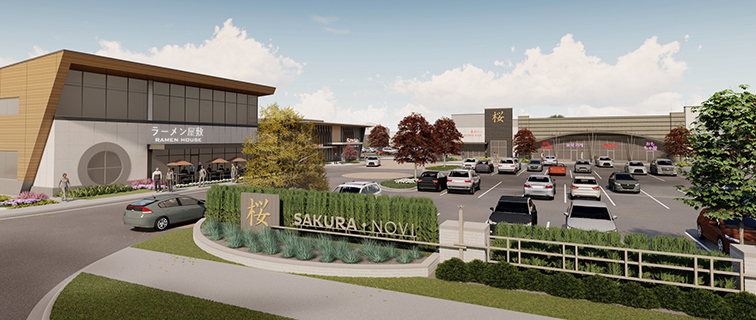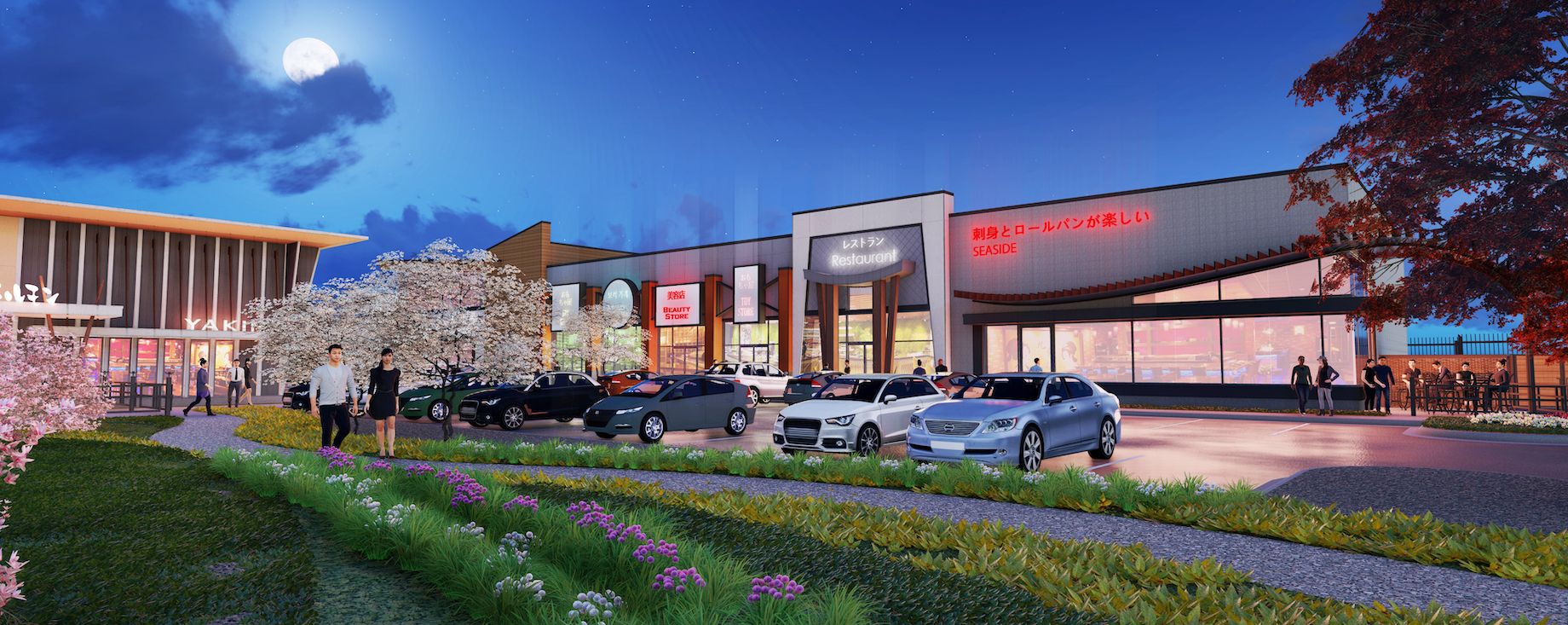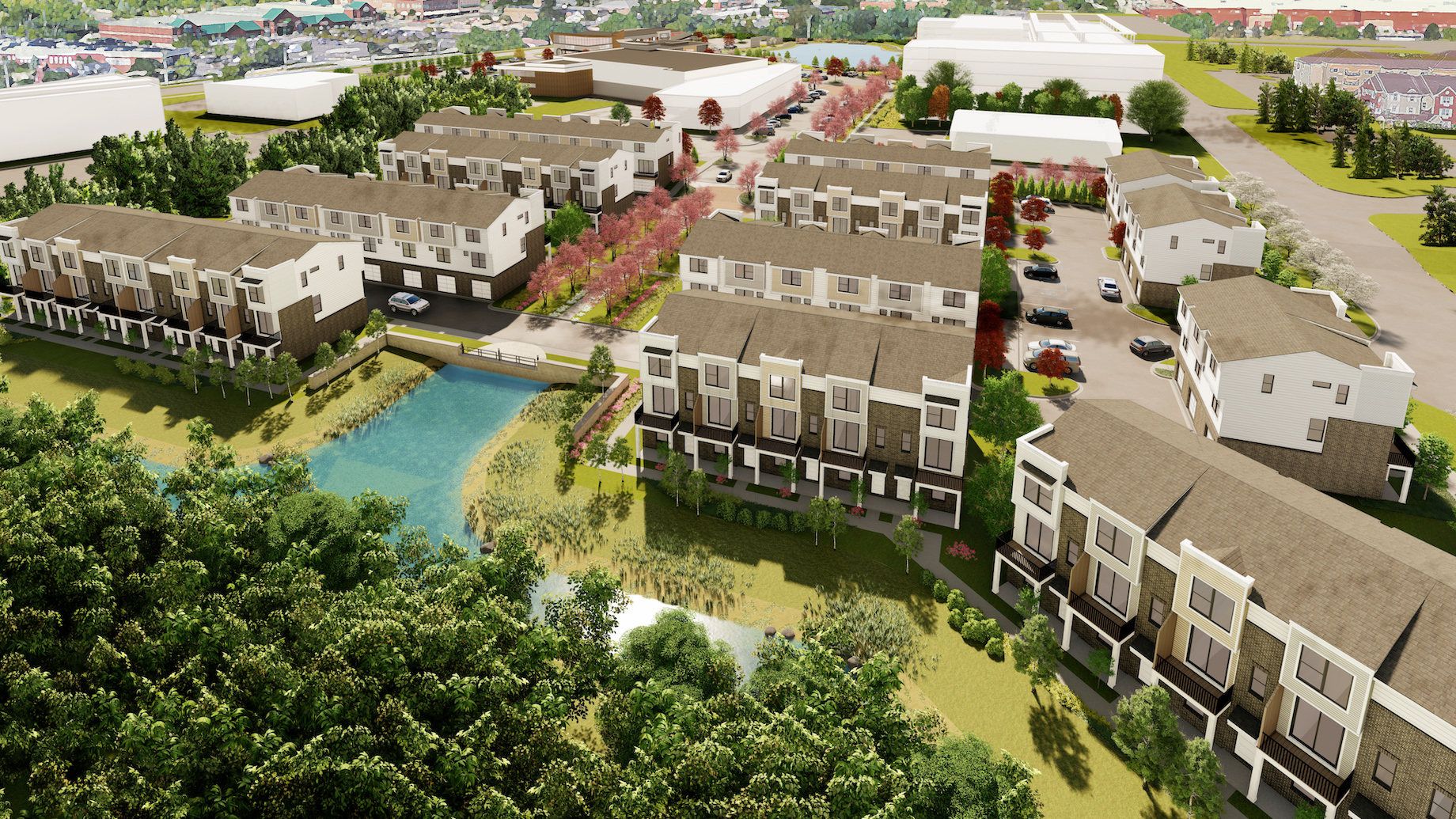A mixed-use project called Sakura Novi is in the works in Detroit that gives a nod to the thousands of Japanese and Japanese Americans who live in the Detroit metropolitan statistical area. A Detroit-based Japanese consular official originally conceived of a Japan-themed district for downtown Novi, Michigan, about seven years ago. Other consular representatives, county officials and members of the Japanese Business Society of Detroit collaborated to move the idea forward.
At least 15,000 Japanese nationals live and work in Novi and southeastern Michigan, said Scott Aikens, vice chairman at Robert B. Aikens & Associates, or RBA, and co-manager of development entity Sakura Novi LLC. “The Japanese community here is very important. You’ve got thousands of people working at offices for companies like Toyota, Subaru, Nissan and Honda, not to mention all the jobs in R&D and at other companies related to the auto sector.”
On a 15-acre site, the developers will offer Japan-inspired architectural elements and amenities like a pond and gardens, along with food-and-beverage outlets that could include revolving sushi bars and Asian barbecue. The leasing team has signed letters of intent with Chinese hotpot concept Chubby Cattle and a boba tea shop. Boba tea, sometimes called bubble tea, originated in Taiwan and blends brewed tea with the likes of milk, sugar and tapioca balls. Financial services, education, urgent care and other service tenants that sign on to the project may be staffed by bilingual speakers of both English and Japanese, the developers said.

The original vision was something like the night market in Obihiro, Hokkaido, Japan, with glowing lanterns, outdoor food carts and a festive atmosphere. However, the project has evolved over the past five years. While the name Sakura Novi is a Japanese reference, southeastern Michigan boasts a large population hailing from other Asian countries; 26% of residents in the region identify as being of Asian origin, according to the Census Bureau. That explains why Sakura Novi is now sometimes billed as the first Asia-themed project of its kind in the state, as opposed to Michigan’s version of Little Tokyo. “We wanted to send a welcome and an invitation to citizens of other Asian nations who live in the community, as well,” Aikens explained.
Foodie-Friendly
As co-manager of Sakura Novi LLC, Philip Kim aims to craft the right mix of food-and-beverage outlets for that diverse target market. He has more than 20 years of experience in the hospitality and F&B sectors and closely tracks global operators’ U.S. expansion plans. As Kim sees it, authentic global cuisines are increasingly popular among people of all backgrounds. “There was a time when just a general category of restaurant like ‘Chinese food’ was enough,” Kim said. “But today’s palates are more sophisticated. That means an international, cultural concept like Sakura Novi can appeal to everybody. Our job is to be absolutely clear on the differences between those cuisines and regions and find the right operators.”
While a typical sushi restaurant has limited appeal, a best-in-class sushi tenant will generate strong word of mouth across multiple communities, including Japanese expats and nationals in the trade area, said RBA senior director of leasing Margaux Keusch. “People who live here and work in the auto industry tend to be very well traveled. They are familiar with Japanese brands and other Asian brands that have a big following, so that’s the kind of authenticity we’re going for.”

Sakura Novi
International fashion retailers, including beauty concepts from South Korea, are broadly appealing in a similar way, Aikens said. He cites the performance of global brands like LVMH-owned Sephora at RBA’s 375,000-square-foot Village of Rochester Hills outdoor shopping district, which is a 10-minute drive from the Fiat Chrysler headquarters in Auburn Hills. “There are a lot of R&D and senior managers, some of them from peripheral auto industry companies, who live and work near The Village of Rochester Hills,” Aikens said, “so the customer is similar to Sakura Novi.”
Making the Marketplace
Plans for Sakura Novi call for 45,000 square feet of retail, restaurant, service and office tenants, as well as 132 townhome apartments. The developers are finalizing a joint-venture agreement with Michigan-based Robertson Brothers Homes for those residential units, Aikens said.
For Japanese nationals working in southeastern Michigan, the project will provide housing and workspaces, as well as familiar services and products. “We’re envisioning a very outdoors-centered place — townhome apartments, three-story walkups, all individual buildings around the pond, all outdoors,” Aikens noted.

For Japanese nationals working in southeastern Michigan, Sakura Novi will provide housing and workspaces, as well as familiar services and products.
To serve these residents’ heightened need for internet connectivity, the developers aim to negotiate a partnership with KDDI America, the U.S. subsidiary of Japanese telecommunications company KDDI Corp., which offers fiber installation, security systems and even virtual reality deployments. “KDDI does some very innovative work in addition to bread-and-butter IT,” Aikens said.
Sakura Novi bought the site from the city of Novi this past August. The municipality included the site in a Commercial Rehabilitation District, paving the way for about $2.5 million in tax abatements, and is working with the developers to finalize the site plan. The state also is reviewing the developers’ brownfield remediation plan. Pending those approvals, the next step is to demolish a house, car wash and some vacant buildings associated with a soil-excavation business formerly located on the site.
The first phase of the project is slated to open in summer 2023. The leasing team includes Michael Yamada, principal of Colliers’ Detroit office, a longtime industrial specialist who will be highly involved in the retail leasing, as well, Aikens said. “Michael is bringing a special expertise to Sakura Novi with his connections and Japanese language skills.” According to Kim, few other Michigan brokers boast such specialized knowledge. “Michael is perhaps the only Japanese broker in the Michigan area,” Kim said. “Beyond his ability to seek out Japanese-owned businesses, he is as passionate about this project as the rest of our team.”
By Joel Groover
Contributor, Commerce + Communities Today